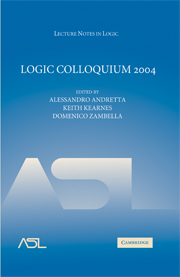Book contents
- Frontmatter
- Contents
- Introduction
- Speakers and Titles
- Abstract elementary classes: some answers, more questions
- On the density of Hausdorff ultrafilters
- Zero-groups and maximal tori
- Constructive set theory with operations
- Parametrized local zeta functions
- Colourings of hypergraphs, permutation groups and CSP's
- Tolerance intersection properties and subalgebras of squares
- Universes in type theory part I—Inaccessibles and Mahlo
- Hausdorff-dimension and weak truth-table reducibility
- Computation and the explanation of intelligent behaviours: ethologically motivated restart
- Constructible sheaves and definability
- An overview of modern universal algebra
- Lecture Notes in Logic
Tolerance intersection properties and subalgebras of squares
Published online by Cambridge University Press: 05 July 2014
- Frontmatter
- Contents
- Introduction
- Speakers and Titles
- Abstract elementary classes: some answers, more questions
- On the density of Hausdorff ultrafilters
- Zero-groups and maximal tori
- Constructive set theory with operations
- Parametrized local zeta functions
- Colourings of hypergraphs, permutation groups and CSP's
- Tolerance intersection properties and subalgebras of squares
- Universes in type theory part I—Inaccessibles and Mahlo
- Hausdorff-dimension and weak truth-table reducibility
- Computation and the explanation of intelligent behaviours: ethologically motivated restart
- Constructible sheaves and definability
- An overview of modern universal algebra
- Lecture Notes in Logic
Summary
Abstract. Tolerance identities can be used [4] in order to provide a fairly simple proof of a classical result by R. Freese and B. Jönsson [7] asserting that every congruence modular variety is in fact Arguesian. The main advantage of the approach using tolerances is that stronger identities can be obtained: the higher Arguesian identities introduced by M. Haiman [12].
Discouragingly enough, however, the approach using tolerances does not appear to give a proof for the local version of Freese and J önsson's Theorem: If every subalgebra of A × A is congruence modular then A is Arguesian.
A common generalization of the results mentioned in the above two paragraphs would furnish the following (a conjecture, so far): If every subalgebra of A × A is congruence modular then A satisfies all Haiman's higher Arguesian identities.
Towards a possible solution of the above conjecture, we introduce a new tolerance identity, called wTIP, and show that it holds in the algebra A provided that every subalgebra of A × A is congruence modular. Moreover, wTIP is equivalent to the Shifting Principle introduced by H. P. Gumm. The known methods using tolerance identities apply, if we restrict ourselves to a particular class of lattice terms.
From congruence varieties to tolerance identities. In the present section we briefly describe how two seemingly unrelated notions used in universal algebra came in touch in an unexpected way. We first recall some basic notions and terminology. Introductory textbooks to universal algebra are, among others, [1, 9, 26]. For a reader not familiar with universal algebra, a preliminary reading of the survey [16] would probably be of great help.
Information
- Type
- Chapter
- Information
- Logic Colloquium 2004 , pp. 109 - 122Publisher: Cambridge University PressPrint publication year: 2007
